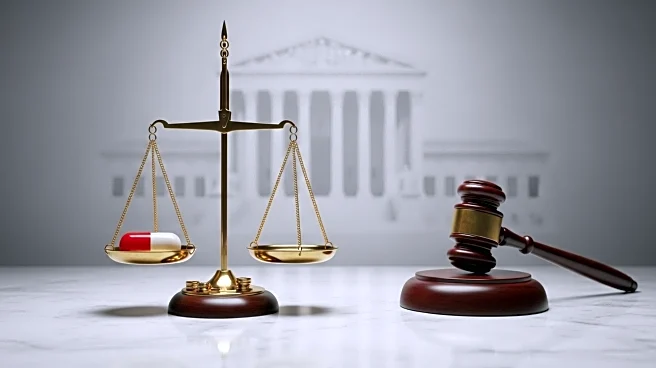What's Happening?
AstraZeneca has escalated its legal challenge against Medicare's drug price negotiation powers to the Supreme Court of the United States (SCOTUS). The pharmaceutical company argues that the current system, established under the Inflation Reduction Act of 2022, is unconstitutional as it allows the Centers for Medicare & Medicaid Services (CMS) to set maximum drug prices without due process or judicial review. AstraZeneca's petition highlights the lack of recourse for manufacturers who object to the selection or pricing of their drugs, leaving them with the option to withdraw from Medicare and Medicaid or face substantial financial penalties. The case follows earlier defeats at district and appeal court levels, with AstraZeneca's diabetes drug Farxiga among the first round of medicines selected for mandatory price reductions starting January 2026.
Why It's Important?
The outcome of AstraZeneca's appeal could have significant implications for the pharmaceutical industry and healthcare policy in the United States. If the Supreme Court rules in favor of AstraZeneca, it may set a precedent that challenges the government's ability to negotiate drug prices, potentially affecting the affordability and accessibility of medications for millions of Americans. The case also raises questions about the balance between government regulation and corporate rights, particularly in the context of healthcare costs and public spending. A decision against AstraZeneca could reinforce the government's position in controlling drug prices, impacting the industry's revenue and pricing strategies.
What's Next?
The Supreme Court's decision on whether to hear AstraZeneca's appeal will be closely watched by stakeholders in the healthcare and pharmaceutical sectors. If the court decides to take up the case, it could lead to a landmark ruling that shapes future drug pricing policies and regulatory frameworks. Meanwhile, other pharmaceutical companies with pending lawsuits against the Medicare negotiation program may adjust their legal strategies based on the outcome of AstraZeneca's case. The decision could also prompt legislative action to address concerns about judicial review and due process in drug pricing negotiations.
Beyond the Headlines
The legal battle over Medicare drug price negotiations underscores broader ethical and legal debates about healthcare access and affordability. It highlights the tension between ensuring fair pricing for consumers and maintaining incentives for pharmaceutical innovation. The case may also influence public perception of the pharmaceutical industry and its role in shaping healthcare policy, potentially affecting trust and transparency in drug pricing practices.









